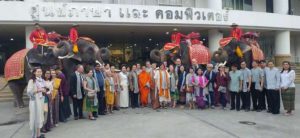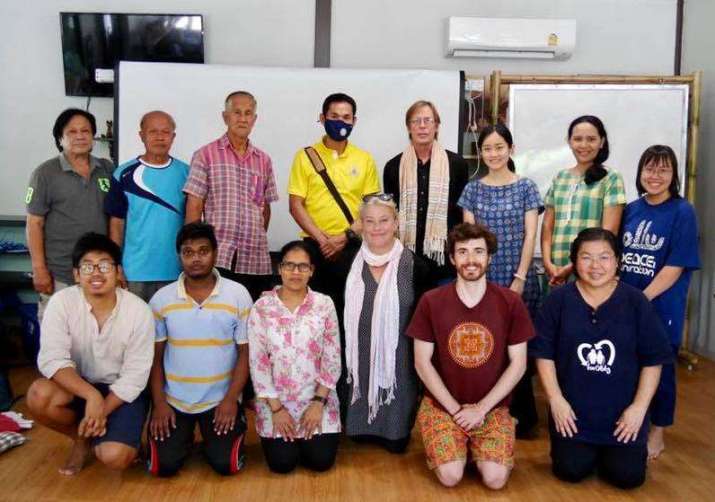
The Bangkok-based International Network of Engaged Buddhists (INEB) has announced that plans are being drawn up for its next School of English for Engaged Social Service, or SENS 2021—a three-month transformative learning program aimed at nurturing young Asian adults and mentoring them as community leaders and agents for compassionate social change. Scheduled to be held early next year, the teaching format for SENS 2021 has been adapted to accommodate potential social-distancing restrictions related to the ongoing pandemic, and based on the experiences of students who attended SENS 2020 in Thailand earlier this year.
Hosted by the INEB Institute, the annual SENS initiative integrates English-language training with self-awareness, mutual support, and an understanding of social and ecological challenges in order to train young adults in leadership, with an emphasis on sustainability—for the planet, for society, and for the human spirit. The program seeks to engender the diverse skills and personal qualities needed to bring about personal, social, and ecological resilience.
“In SENS 2020, our fifth annual program, we brought students from Vietnam and Japan for the first time, in a cohort that numbered 14 students altogether. We faced the break-up of our in-person course two weeks early as a result of the COVID-19 pandemic, yet we found that we were still able to complete the course online, with beautiful graduation talks from the students. We are confident in the value of our program for creating deep learning and human connection, and we intend to carry on,” the academic director of the SENS program, Ted Mayer, said in a statement received by Buddhistdoor Global.
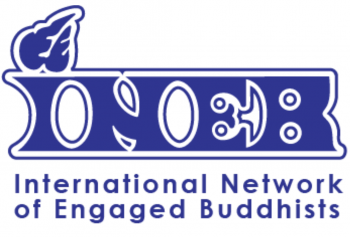
SENS 2020 kicked off in Thailand in January this year under the theme “Transform Your English, Transform Your World.”
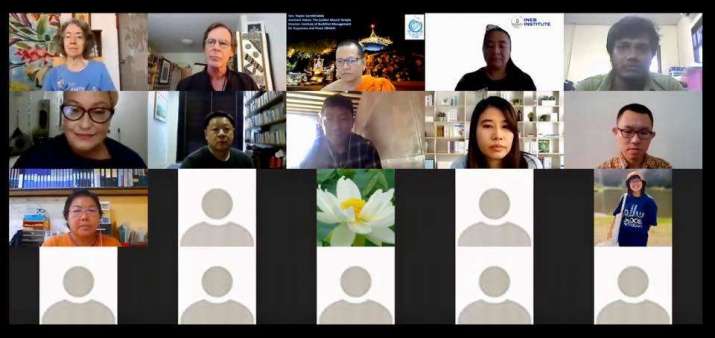
“We are now planning our SENS 2021 program. And it will be different this time,” Mayer explained. “We know that the current pandemic is a kind of foretaste of the chaos that will ensue as the climate crisis accelerates. And we know from many sources that the education and empowerment of women will play a key role in addressing that crisis. For this reason we will invite 12 women from Southeast Asia and six additional men and women from around the world to join a special five-week segment of the SENS 2021 program on Cultivating Women’s Leadership on Climate Change in Southeast Asia. Following that special segment, which begins on 10 January, we will invite all 18 students to join us for an additional seven weeks of the integrated SENS curriculum. We have already interviewed women who lead women’s centers or sustainability programs in Southeast Asia and the Asian region. These interviews have shown us that there is a real need and interest, and inspired us to move forward with our plan.”
The INEB Institute was established with the intention of creating a model of higher learning that integrates personal and social-structural transformation in its study programs. Infused in the tradition of the socially engaged Buddhism promoted and practiced by INEB, the institute’s stated purpose is to help young people rediscover their fundamentally interdependent nature while developing the skills needed to help them become agents for genuine social change. The institute’s programs are designed to integrate new practices and learning strategies that cultivate peace and reconciliation, environmental healing, alternative education, sustainable economics, and the capacity for spiritual growth and leadership.
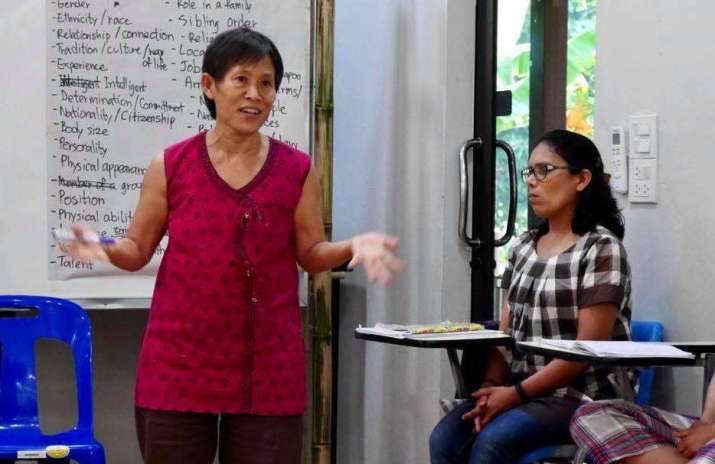
“To make the SENS courses effective, we need to choose participants who are likely to carry on what they learn with us,” Mayer observed. “They need to be open-minded, able to listen, and committed to working for the wider good—not only their own career or family. For this reason we take our selection procedure very seriously. We begin with student applications, then follow up when appropriate with a personal interview. . . . Through interviews over many months . . . we identified roughly 18–20 students who would be excellent candidates to study in SENS. In fact, interest in the SENS program has been growing and we were forced to turn away a number of highly qualified students, with a sincere invitation for them to apply to SENS 2021.”
INEB was established in Thailand, in 1989 by the prominent Thai academic, activist, and social critic Sulak Sivaraksa and a group of Buddhist and non-Buddhist thinkers and social activists. It was formed with the aim of connecting engaged Buddhists around the world to promote understanding, cooperation, and networking among inter-Buddhist and inter-religious groups, and to address global issues such as human rights, conflict resolution, and environmental concerns.
Conceived as an autonomous organization under the Bangkok-based Sathirakoses-Nagapradeepa Foundation, INEB’s members include monks, nuns, activists, academics, and social workers from more than 25 countries in Asia, Australasia, Europe, and North America, working together under the umbrella of kalyaṇa-mittata.* While founded in the Buddhadharma, INEB welcomes members from other spiritual traditions and recognizes the importance of interfaith activities, stating: “INEB’s philosophy and practice is based on compassion, social justice, non-violence, and co-existence as put forth by Gautama the Buddha. The network’s core mission is to confront and end suffering using analysis and action guided by the Four Noble Truths.” (INEB)
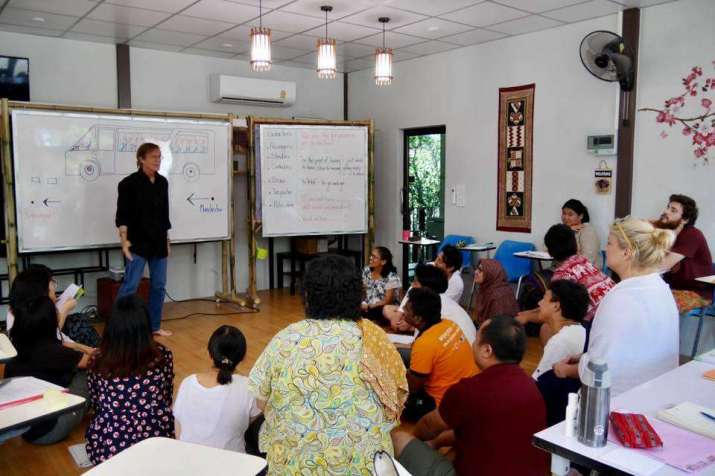
“Our traditions remind us that even in the height of chaos, crisis, and uncertainty, it is always possible to pause, to still one’s mind, and direct one’s attention to that which is wholesome and good in oneself, in others, and in the world,” said Mayer.
Donations to support students attending SENS 2021 and the INEB Institute are gratefully accepted and can be made here.
* Kalyaṇa-mittata (Pali) kalyaṇa-mitrata (Skt.), the Buddhist concept of spiritual friendship.
See more
School of English for Engaged Social Service (SENS)
INEB Institute
The INEB Institute Completes its SENS 2020 Program (GlobalGiving)
Train Leaders in Asia for Peace and Sustainability (GlobalGiving)
How to support INEB Institute
International Network of Engaged Buddhists










